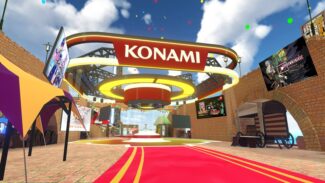At first glance, the idea of virtually attending a gaming show in VR seems immensely promising. Events like E3 and Gamescom are thousands of miles away from most people, and some gamers can only ever dream of stepping onto an expo floor to get a first look at titles to come. In theory, a virtual version of those shows makes it possible for anyone to do just that.
But, as Tokyo Game Show VR proves, there are still hurdles to overcome to make the experience truly compelling.
There is a certain buzz to steeping through TGS VR’s virtual gates for the first time. This social experience, running on the new xambr platform, pays respect to past TGS events with posters from older shows before you step into a lobby dotted with giant statues from Sonic, Monster Hunter and more. I’d imagine it’s at least a little like the excitement of visiting Japan’s new Super Mario park for the first time, and there’s power to finally seeing some iconic characters in VR, even if it’s just a static 3D model.
The layout, too, is well done. Load into the main area and you’ll tour a circular hallway of recognizable names, from Sega to Capcom and Konami to Square Enix. It’s incredibly impressive to see these big brands — only a few of which have actual VR games on the way — involved in the event and an encouraging sign that there’s a future for this space.
But after 10 minute trawl around TGS VR’s series of trailers you’ve already seen for games we’ve known about for a while is pretty much all that’s on offer here. Again, some of the booths are wonderfully themed, including Bandai Namco’s giant tribute to Pacman, Capcom’s Monster Hunter booth and an incredible diverging path that recreates a scene from Attack on Titan in VR. For the most part the experience definitely looks the way it should but, beyond that, there isn’t too much to see or do inside TGS VR.
Granted it’d be next to impossible to recreate the ‘full’ experience here. You couldn’t have, say, 100 stands with playable demos of the next Final Fantasy game for endless reasons. But TGS VR could take a page from the excellent Virtual Market experience inside VRChat, which includes interactive minigames and experiences to keep you engaged in its celebration of pop culture. Why not let users pick up some of Monster Hunter’s ridiculous weapons in VR, for example? Or how about a virtual maze reflecting Dracula’s castle to promote the Castlevania Collection?
There are some attempts at this, including a lacklustre Attack on Titan 360 degree video, and a metagame that rewards you for watching certain trailers, but they aren’t anywhere near as engaging as what you can find elsewhere.
But I don’t say all of this to dissuade. I’m actually incredibly happy TGS pulled this off because, frankly, someone needed to. Not even Facebook has done a virtual version of its own Connect conference yet and, while there are many technical challenges involved, it seems like too important of a VR use case not to be testing the waters right now.
This is more encouraging than anything else, then. I hope E3, Gamescom and the like all look to the example TGS VR sets as we move into 2022 and figure out how to top it. It’s a turbulent time for in-person events and TGS VR presents an incredibly interesting path forward. Full marks for effort, then.





